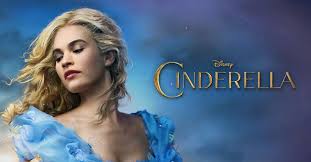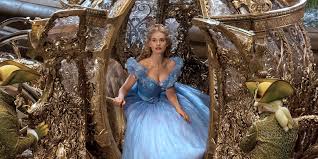
I've recently criticized Disney for their contemporary live-action renditions and the dubious themes that accompany such presentations. Of course, this is in regard to the moral implications or suggestions that assault the audience, as if we were incapable of living our own lives without the romanticized and fruitless guidance of films such as
"Into the Woods."
It is this notion that led me to believe that Disney, a brand whose name is synonymous with the terms animation and fairy tale, had completely lost its ability to provide a simplistic yet heartwarming creation
—one that dwells in the buoyant heart of human nature. However, it would seem that I spoke too soon. "Cinderella" is certainly a picture that encapsulates the beloved personality of Disney's Golden Age with relative ease; it is nothing short of a breath of fresh air and a reminder of what Walt Disney worked so tirelessly to bring into existence: Magic.
For those of you who direly have need for a plot summary, here it is:
Ella is a young woman who was born and raised on the principles of her loving mother, which consist of virtues such as courage and kindness. She lives a relatively tranquil life, that is, until the untimely death of her parents leaves her in the custody of Lady Tremaine, a cold-hearted widow who takes much pride in the mistreatment of her newly acquired stepdaughter. After being reduced to a servant
—and to essentially an object of pure disdain
—Ella runs away only to find solace in the form of a young apprentice by the name of Kit, who is actually the prince of a neighboring province.
This fateful meeting leaves the prince enthralled by the spirit and goodness of the mysterious handmaiden, which subsequently compels him to throw an elaborate ball for the masses in hopes that he may lay his eyes on her beauty once more. Naturally, Cinderella (a name in which her stepsisters kindly bestow upon her) is forbidden to attend, yet through the magic of her enigmatic Fairy Godmother, Cinderella will become the epitome of gracefulness that she has always reserved for her inner being and will find her way to that most cherished happy ending.
The most striking aspect of this film (and the most unanticipated to be quite frank) is undoubtedly its construction as numerous techniques are employed with such delicate care that it becomes simply a pleasure to indulge upon. The hair, costuming, and makeup designs for the wicked stepmother and Cinderella, herself, are quite splendid and only help to accentuate the qualities of their disparate personalities. Likewise, the production design of the two notable settings (that being, Cinderella's country home and the prince's castle) is spot-on. The pastoral magnetism of the rich countryside not only alludes to the determination of Cinderella's character, but it ultimately comes to reflect the gentle soul of her being. Furthermore, the castle of the prince, in all of its architectural glory, is without doubt executed for sheer visual impact; nevertheless, excelling in its rudimentary aims.

Additionally, the utilization of lighting and cinematographic techniques was downright mesmerizing. (Several scenes are dictated by the brilliant use of these two forgotten and incredibly vital ingredients of filmmaking.) The employment of high-intensity, overhead lighting in the expository scenes brilliantly illuminates the aura of Cinderella's mother, who ultimately comes to symbolize the very fiber of her being; this is in direct contrast to the Lady Tremaine, whose scenes are enshrouded in shadows and characterized by a harsh diffusion of radiance. In fact, there is even the presence of an extremely underrated lighting effect as once the cruel Lady Tremaine arrives at the castle for the ball (in hopes that one of her crude daughters can coax the prince into marriage), we see fireworks literally light up her eyes.
In true fairy tale fashion, we are brought into the fold via a subtle zooming of the camera
—as if we were a general observer who had just become entranced by the events at hand. As a matter of fact, it is this objective, or spectator if you will, point of view that dominates the picture, and although it creates a sense of emotional distance between the characters and the audience, it is entirely warranted here. The cinematic composition of the film is exquisitely designed, as every object of dramatic significance is focused upon precisely in every scene and while depth is conveyed adequately through what normally appears to be a flat surface. (The latter of which is executed in a plethora of manners. None more startling, however, than the image of the Lady Tremaine, produced by way of foreground framing, as she is presented to us through the pane of a window and as she eavesdrops on a conversation between Ella and her father.)
Beyond the visual department, however, are the performances of
Lily James and
Helena Bonham Carter, both of which never flounder in their vitality. James, in her first leading role in a genuine box-office production, is simply picture perfect in her interpretation of Cinderella, and her beautiful yet innocent appearance is so conceivable that we are ultimately distracted from her talents as an actress. Not only does her sincerity permeate the foundation of the film, but it is her reaction shots that emphasize the delicacy of her character. In essence, Cinderella is the tormented heroine, which is quite a difficult element to convey, especially when one considers the natural cheerfulness of her personality. Although emotional restraint is enacted without hesitancy, James shines in several scenes where this subtle pain must be felt in order to satisfy the needs of the performance.
Carter, in a role that brims with stereotypical character irony (considering the despicable nature of her previous undertakings), portrays the Fairy Godmother in such a way that it enlivens the atmosphere of the picture invariably. She surely brings magic to a scene that desperately requires it, and, most importantly, she seemed to have a great deal of fun while doing so.
With all that being said, the gem of the film is unquestionably
Cate Blanchett in her portrayal of the vile stepmother Lady Tremaine. Blanchett is unmatched in poise and demeanor as she controls scene after scene with her frigid execution of dialogue and mannerisms that conjure up thoughts of a snake in the grass. She is obviously more wicked than the original depiction of the same character, and it is this quality that is illustrated so well that it almost seems as if terror oozes directly from her physical appearance, among other places.
There are a handful of differences between this rendition and the original: Most notably, being the presence of the songs and the importance of the surrounding animals. There is no denying that the songs were an integral portion of the original production, and although this film was never intended to be a musical, one is left to wonder how "Bippity Boppity Boo" could have complimented the eccentric performance of Carter. As far as Gus and company are concerned, their importance has diminished somewhat although they still provide an emotional outlet for Cinderella and the opportunity for unwarranted humor. The integration of the computer-generated mice is sufficient enough and never intrudes where it shouldn't. In fact, they still help Cinderella construct her evening gown for the ball, although the refashioned scene is surely not as grand as the original.
"Cinderella" also finds success in the parallel storyline of the prince. The persona of our lovable prince charming is discerned through several well-crafted scenes in which we learn of his own conflict, which primarily stems from the temporal factors aligned with royalty and the accompanying pressure to marry within one's social hierarchy. This absolutely gives depth to a character that is universally renown for his flat personality, and it impels the story in the right direction time after time.
Looking back, it is evident that the original "Cinderella" released at a pivotal time for the Disney corporation, as a heavy debt instilled a sense of uneasiness and melancholy throughout the company. The financial success of the film helped to eliminate the doom and gloom mentality, and it has since become cherished as a masterpiece of animation and innovation. Although this latest rendition does rely on the aforementioned theme of moral implication (which, in this particular instance, lies in the realm of courage and kindness), one thing has not changed: "Cinderella" is a film that teaches young children to never surrender who they truly are. She is a character of average stature who becomes a princess for seemingly no other reason than because she is a woman and because she never pretends to be what she is not. Every young girl dreams of becoming a princess; the story of Cinderella simply makes it happen.